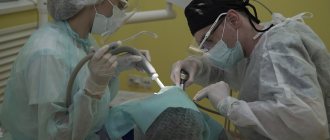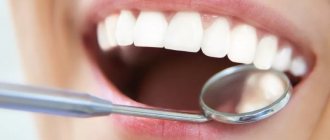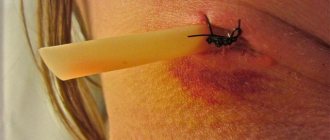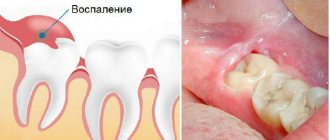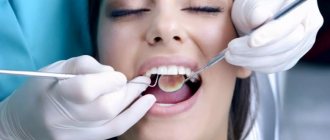People who do not have problems with their teeth are very rare. It's all about "universal" human vices. This includes laziness in taking care of your oral cavity, basic ignorance, and, of course, fear of dentists. The classic calculation that “it will pass” has left millions of people without teeth. Any dental disease requires professional treatment. Losing teeth and the dangerous complications associated with this when postponing a visit to the doctor is only a matter of time. Gum problems are no exception. Why gums hurt and why you need to start treating them in a timely manner - we’ll talk about this further.
Causes of pain in the gums
Bacterial inflammation.
A common cause of swelling and pain in the gums is the proliferation in the tissues of pathogenic bacteria that constantly live in the oral cavity. Inflammatory processes on the mucous membrane caused by the proliferation of bacterial flora of the oral cavity are always the result of a weakened immune system. As long as the immune system performs its functions normally, bacteria are not dangerous. As soon as the body's natural defenses are reduced, microorganisms begin to multiply rapidly and cause inflammation.
Lack of hygiene.
Irregular, careless brushing of teeth, leaving plaque on them can provoke the growth of pathogenic microflora. It's all about the acid that microbes produce. It destroys enamel and causes inflammation of the gums.
Tartar
Poor cleaning leads to the formation of deposits - tartar. These deposits damage the bone tissue that anchors the tooth. Because of this, periodontal pockets form, they begin to bleed, and inflammation of the surrounding tissues develops.
Other reasons
Gums hurt in pregnant women, people with a genetic predisposition or with various chronic diseases. Also, pain in the gums can be caused by errors in prosthetics, taking certain medications, allergies, smoking, and injury.
Symptoms
Most often, painful sensations occur during chewing or eating hot or cold food. Some patients complain of almost constant, aching or throbbing pain.
The inflammatory process can develop rapidly. In this case, the pain is usually sharp and severe. May be accompanied by swelling of the gums and swelling of the face. Sometimes the inflammation lasts for years, and since the patient does not experience severe pain, he delays the visit to the dentist, aggravating the situation.
Do your gums hurt? - To the doctor!
Gum pain is often preceded by bleeding, swelling and inflammation. These are all standard symptoms of gingivitis. Standard symptoms of gingivitis and so that gingivitis does not turn into periodontitis and the process of destruction of bone tissue does not begin, leading to mobility and further loss of teeth. To avoid these processes, you must contact your dentist at the slightest manifestation.
Is it possible to treat gums at home using folk remedies? - Can. But, unfortunately, this won't help. And it will even make the problem worse. Prevention could help, but it needs to be done in a timely manner. After all, preventing a disease is easier than treating it.
If your gums are swollen and bleeding, you need a qualified periodontist immediately. He will make the correct diagnosis and prescribe treatment.
How to relieve pain when pressing on the gums
Remember, only a dentist can help eradicate the pain experienced when pressing on the gums or teeth. It is important to quickly determine the cause of the discomfort and prescribe proper treatment. However, to eliminate discomfort before visiting a doctor, you can try the following methods:
- Take painkillers, such as paracetamol or analgin. The main thing is not to overdo it with such drugs, as they can be addictive and negatively affect the functioning of internal organs.
- Brush your teeth properly, trying to free the inflamed cavity from plaque and food particles.
- Rinse your mouth with a solution of baking soda, furatsilin or potassium permanganate.
Remember, it is strictly forbidden to warm your cheeks and gums or apply warm compresses to the sore spot. Heat can trigger more severe inflammation. Also, you should not take antibacterial or anti-inflammatory drugs without a doctor’s prescription.
It is also prohibited to put analgesics into the cavity of a diseased tooth. This popular method is far from safe: you can not only cause an infection, but also get a serious burn to the mucous membrane.
Gingivitis
The first most common periodontal disease, the symptoms of which are bleeding and swelling of the gum tissue. Develops at any age. Gingivitis is common in pregnant women and teenagers. In this case, the disease begins due to changes in hormonal levels.
The pathological process can be limited to a small area or occur in a generalized manner, involving the gums in the area of all teeth. The initial stage of gingivitis is characterized by pain and bleeding in the gums when brushing your teeth. In the future, the gums may hurt even at rest.
Prevention of complications
Normally, immediately after tooth extraction, there should be a red blood clot in the socket. On the second day, this clot becomes covered with a whitish or yellowish coating, and after a week, a new gum begins to appear at the site of removal.
In order for the gum healing process to proceed as quickly and painlessly as possible, you should adhere to the following general recommendations:
- We keep it cold for the first day. Freeze a bottle of water, wrap it in a towel and hold it in the removal area for 10-15 minutes, applying it to the cheek. Breaks are 10-15 minutes. Cold prevents swelling and is a good pain reliever.
- In the first three days, diet. We exclude hard foods, fibrous foods (cabbage, meat), hot foods and drinks.
- On the first day, we exclude physical activity (weight lifting, gym, etc.). The load leads to an increase in pressure, and due to the increased pressure, a blood clot can be washed out of the socket.
- We do not rinse our mouths on the first day. From the second day we make baths with antiseptics (we put the solution in our mouth, tilt our head to the side where it was removed, hold it for a minute, spit it out).
- The day before removal and the first three days after, you can take antihistamines (loratadine, tavegil and others). In addition to the antiallergic effect, they also have a pronounced anti-edematous effect.
- If it hurts a lot, we take painkillers. Nimesil, solpadeine, ibuprofen, ketanov or other drugs (as recommended by your doctor). It is better to choose one drug and not mix it with others.
All other measures (antibiotics, physiotherapy, etc.) are only as prescribed by your doctor.
Periodontitis
Bone tissue is involved in inflammation. In the affected area, the teeth begin to seem to be squeezed out of the gums and become mobile.
The onset of the disease is indicated by more pronounced bleeding of the gums, a change in its color, and sensitivity may appear when brushing your teeth and from temperature irritants. The success of this treatment is determined not only by the doctor’s competence, but also by the patient’s active participation in the process and strict adherence to the dentist’s recommendations.
Injury
You can injure your gums with an impact, as a result of a burn, even with careless brushing of your teeth. If you have injured the oral mucosa, it is better to carry out antiseptic treatment of the wound surface.
Often, gums are injured chronically. Tissues are subject to constant injury due to:
- broken bite;
- punctures (piercings) of the tongue, lips or cheeks;
- incorrectly selected prosthesis;
- habits of biting off threads with teeth, etc.
Chronic injury entails a serious complication - tissue necrosis, which is treated exclusively surgically.
Tooth hurts after nerve removal and filling
Only a dentist after an examination will help you figure out why a tooth hurts after removing a nerve and filling its canals. Treating teeth on your own without a diagnosis is highly discouraged.
In dental practice, the procedure for treating tooth canals by removing a nerve is a rather complex manipulation. Cases of medical error are common. They are fraught with various complications, in which the filled tooth continues to hurt.
The main reason why a “dead tooth” (without a nerve) is bothersome is:
- removal of the filling material beyond the apex of the tooth - this occurs due to incorrect definition
- working tooth length;
- the doctor filled the canal incorrectly;
- a tool broke off in the canal;
- root perforation of the tooth;
- If your tooth aches, you may be allergic to the filling material.
It is worth considering that a tooth under a filling can hurt even without a nerve. After all, during the extraction procedure, only a small part of it is removed from the root canal, which branches off from the main nerve trunk. In addition, when removing and filling canals, dental tissues are damaged. When an anesthetic is applied to a tooth, pain is not felt; it begins to be felt after the anesthesia wears off. Such painful sensations are called post-filling.
After removal of a nerve, neighboring teeth can often be bothered, but it seems as if it is the treated tooth that is hurting. An experienced doctor will examine the dentition to identify and eliminate this problem. However, it is worth sounding the alarm when the nerve has been removed for a long time, and the tooth continues to hurt - this symptom may signal the development of chronic pulpitis or periodontitis.
Preventive recommendations
To avoid serious periodontal diseases, the treatment of which will require great effort and material costs, follow these simple rules.
- Contact a periodontist for a consultation.
- Together with your doctor, select the right toothbrush and toothpaste for regular use.
- Follow the classic rules of oral hygiene carefully and regularly. Brush your teeth at least 2 times a day. Use mouthwash after every meal.
- Get additional hygiene products for daily care, for example, dental floss, irrigator.
- Eliminate from your diet foods that are too hot and cold, too sour and salty.
- Reduce the amount of sugar you consume, especially sweets and cookies.
- Eat more foods of plant origin, take vitamin complexes regularly.
Sore and bleeding gums are not the norm. Worsening periodontal problems greatly increases the risk of tooth loss. Therefore, if you find signs of gingivitis, periodontitis, or chronic injury to gum tissue, be sure to make an appointment with your dentist. Specialists of the “Center for Modern Dentistry” are waiting for you!
What to do if alveolitis begins?
As mentioned above, alveolitis is an inflammation of the tooth socket. Here, in addition to normal tissue swelling, you will also experience redness of the mucous membrane, acute pain, and an odor from the socket (as pus and food debris accumulate there). These symptoms are increasing every day.
Alveolitis cannot be treated at home. By taking antibiotics, ointments, rinses and other “home” measures, you can either achieve nothing at all, or transfer the process into a chronic form, when, with minimal symptoms, the bone in the area of removal will dissolve and as a result we will get a huge defect in the bone, which will be difficult to correct. Alveolitis in Samara should be treated only together with a surgeon, strictly adhering to his recommendations.
What does a surgeon do for alveolitis?
- Anesthesia is given;
- When everything has become numb, the surgeon cleans the tooth socket again (removes pus, tooth fragments or bones, if any, rinses the socket with solutions of antiseptics and antibiotics);
- After treating the wound, there are two options: some kind of drug can be put into the hole. Or they can simply fill it with fresh, clean blood and wait for a new clot to form;
- After cleaning, antibiotics, rinses, and epithelializing drugs are prescribed.
After such measures, a noticeable improvement occurs on the second or third day (pain and swelling begin to subside), but healing of the hole takes longer - up to three weeks.
